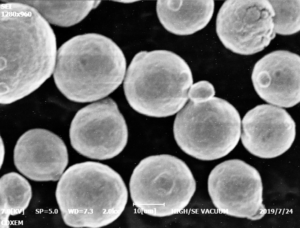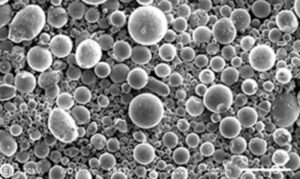FeCoNiCr-Pulvereine hochentropische Legierung (HEA), gewinnt aufgrund ihrer außergewöhnlichen Eigenschaften in der modernen Fertigung, der Materialwissenschaft und bei industriellen Anwendungen zunehmend an Bedeutung. Dieses Metalllegierungspulver ist für seine Vielseitigkeit und robuste Leistung bekannt und besteht aus Eisen (Fe), Kobalt (Co), Nickel (Ni) und Chrom (Cr). Ganz gleich, ob Sie Ingenieur, Forscher oder Hersteller sind, die Kenntnis von FeCoNiCr-Pulver kann Ihre Prozesse und Anwendungen verändern.
In diesem Artikel befassen wir uns eingehend mit der Zusammensetzung, den Eigenschaften, den Anwendungen, den Vorteilen und den Grenzen von FeCoNiCr-Pulver. Wir vergleichen auch verschiedene Modelle und Qualitäten, diskutieren Lieferantenoptionen und beantworten einige häufig gestellte Fragen.
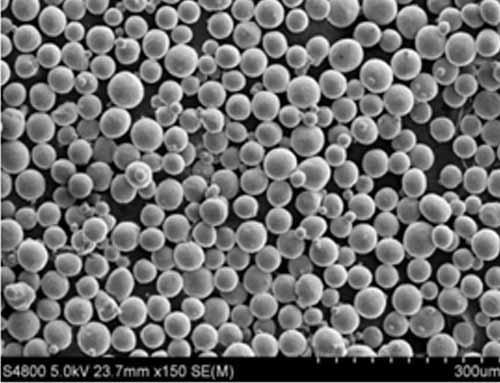
Überblick über FeCoNiCr-Pulver
FeCoNiCr-Pulver gehört zur Familie der hochentropischen Legierungen, bei denen es sich um Multielement-Systeme mit nahezu gleichen Anteilen handelt. Diese einzigartige Zusammensetzung führt zu einer außergewöhnlichen Festigkeit, Korrosionsbeständigkeit, thermischen Stabilität und Ermüdungsbeständigkeit - Eigenschaften, die bei kritischen technischen Anwendungen sehr wünschenswert sind.
Die wichtigsten Details auf einen Blick
| Eigentum | Einzelheiten |
|---|---|
| Elements | Eisen (Fe), Kobalt (Co), Nickel (Ni), Chrom (Cr) |
| Kategorie | Hoch-Entropie-Legierung (HEA) |
| Anwendungen | Luft- und Raumfahrt, Automobilindustrie, Biomedizin, Werkzeugbau, Energiespeicherung |
| Stärken | Ausgezeichnete mechanische Eigenschaften, thermische Stabilität und Korrosionsbeständigkeit |
| Produktionsmethoden | Pulvermetallurgie, additive Fertigung und thermisches Spritzen |
Zusammensetzung von FeCoNiCr-Pulver
Die Zusammensetzung von FeCoNiCr-Pulver besteht aus nahezu äquimolaren Verhältnissen der einzelnen Metalle, die darin enthalten sind. Durch geringfügige Änderungen der Zusammensetzung lassen sich jedoch bestimmte Materialeigenschaften erzielen. Hier ist eine Aufschlüsselung:
| Zusammensetzung | Elementgehalt (Gew.-%) | Rolle |
|---|---|---|
| Eisen (Fe) | 20-25 | Bietet Grundfestigkeit und Duktilität |
| Kobalt (Co) | 20-25 | Verbessert die Magnet- und Verschleißfestigkeit |
| Nickel (Ni) | 20-25 | Verbessert Korrosionsbeständigkeit und Zähigkeit |
| Chrom (Cr) | 20-25 | Erhöht die Oxidationsbeständigkeit und Härte |
Merkmale von FeCoNiCr-Pulver
Was macht FeCoNiCr-Pulver so einzigartig? Hier ist ein detaillierter Blick auf seine Eigenschaften:
| Charakteristisch | Beschreibung |
|---|---|
| Thermische Stabilität | Behält seine mechanischen Eigenschaften bei hohen Temperaturen, ideal für Anwendungen in der Luft- und Raumfahrt. |
| Korrosionsbeständigkeit | Hervorragende Oxidationsbeständigkeit, daher für raue Umgebungen geeignet. |
| Hohe Härte | Hervorragende Verschleißfestigkeit, die die Lebensdauer von Werkzeugen und Komponenten verlängert. |
| Magnetische Eigenschaften | Starke magnetische Eigenschaften, insbesondere bei Anwendungen mit Kobalt- und Eisengehalt. |
| Anpassungsfähigkeit | Das Verhältnis der Elemente kann für bestimmte Anwendungen angepasst werden. |



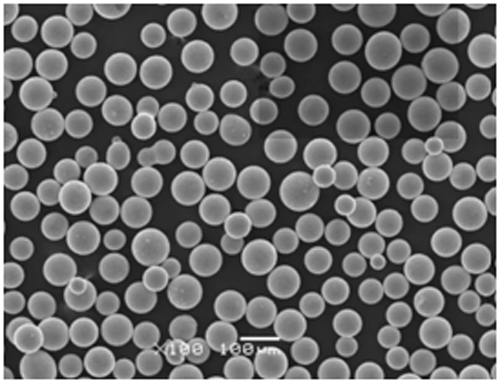

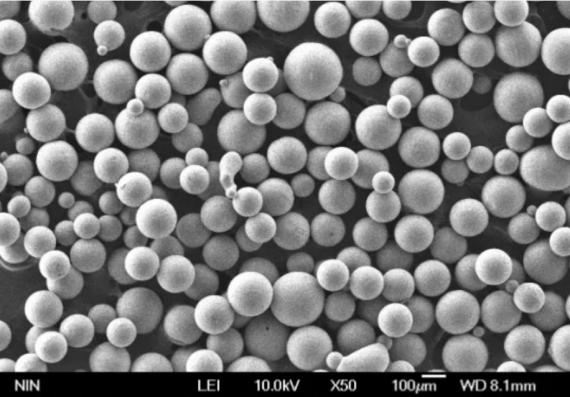
Vorteile von FeCoNiCr-Pulver
Warum FeCoNiCr-Pulver gegenüber anderen Legierungen bevorzugen? Hier ist der Unterschied:
- Außergewöhnliche Langlebigkeit: FeCoNiCr übertrifft viele traditionelle Legierungen in hochbelasteten Umgebungen.
- Vielseitigkeit der Anwendungen: Von der Luft- und Raumfahrt bis zur Biomedizin passt es sich an verschiedene Bereiche an.
- Kosteneffiziente Produktion: Die Pulvermetallurgie reduziert den Abfall und optimiert den Materialeinsatz.
- Umweltfreundlich: Eine längere Lebensdauer der Komponenten führt zu einem geringeren Material- und Energieverbrauch.
FeCoNiCr-Pulvermodelle und -qualitäten
Es gibt verschiedene Modelle von FeCoNiCr-Pulver für unterschiedliche Branchen und Anwendungen. Nachstehend sind zehn bemerkenswerte Modelle aufgeführt:
| Modell | Beschreibung |
|---|---|
| FeCoNiCr-Al | Verbesserte thermische Stabilität für Hochtemperaturanwendungen. |
| FeCoNiCr-Mn | Verbesserte Korrosionsbeständigkeit für Meeresumgebungen. |
| FeCoNiCr-Ti | Titan-Zusatz für höhere Festigkeit und leichte Anwendungen. |
| FeCoNiCr-WC | Wolframkarbidzusatz für extreme Verschleißfestigkeit bei Werkzeugen. |
| FeCoNiCr-BN | Bornitrid verbessert die Schmierfähigkeit und Verschleißfestigkeit. |
| FeCoNiCr-Cu | Kupfereinschlüsse für bessere elektrische Leitfähigkeit. |
| FeCoNiCr-Nb | Niob-Zusatz für die Ausscheidungshärtung in Bauteilen der Luft- und Raumfahrt. |
| FeCoNiCr-Zr | Zirkoniumgehalt für hervorragende Oxidationsbeständigkeit. |
| FeCoNiCr-Si | Siliziumzusatz für bessere Bearbeitbarkeit und Oxidationsbeständigkeit. |
| FeCoNiCr-Ce | Seltene Erdelemente für verbesserte magnetische und thermische Eigenschaften. |
Anwendungen von FeCoNiCr-Pulver
FeCoNiCr-Pulver wird aufgrund seiner Vielseitigkeit und überlegenen Eigenschaften in zahlreichen Branchen eingesetzt:
| Industrie | Anmeldung | Spezifische Vorteile |
|---|---|---|
| Luft- und Raumfahrt | Triebwerkskomponenten, Turbinenschaufeln | Hohe thermische Stabilität und Ermüdungsfestigkeit. |
| Automobilindustrie | Motorenteile, Auspuffanlagen | Korrosionsbeständigkeit und Hochtemperaturverhalten. |
| Biomedizinische | Implantate, Prothetik | Biokompatibilität und Verschleißfestigkeit. |
| Werkzeugbau | Schneidwerkzeuge, Gussformen | Extreme Härte und Verschleißfestigkeit. |
| Energie | Batterieelektroden, Brennstoffzellen | Hohe elektrische Leitfähigkeit und Stabilität. |
Spezifikationen, Größen und Qualitäten
| Parameter | Einzelheiten |
|---|---|
| Partikelgrößenbereich | 10-150 µm |
| Reinheitsgrade | >99% |
| Erfüllte Normen | ASTM F75, ISO 5832-1 |
| Verpackungs-Optionen | 1 kg, 5 kg, 25 kg |
| Grades verfügbar | Standard, Ultra-Pure, kundenspezifische Zusammensetzung |
Lieferanten und Preisangaben
| Anbieter | Region | Preisgestaltung (ca.) | Besondere Merkmale |
|---|---|---|---|
| Tischlertechnik | USA | $100-$120/kg | Bietet kundenspezifische Legierungsformulierungen an. |
| Hoganas AB | Schweden | $90-$110/kg | Führend bei pulvermetallurgischen Werkstoffen. |
| Sandvik Werkstoffe | Global | $95-$125/kg | Hochreine und zuverlässige Lieferkette. |
| AMETEK Spezialität | USA | $105-$130/kg | Schwerpunkt auf Legierungen für die Luft- und Raumfahrt. |
| VDM Metalle | Deutschland | $110-$140/kg | Bekannt für hochwertige Pulverstandards. |

Pro und Kontra von FeCoNiCr-Pulver
| Aspekt | Profis | Nachteile |
|---|---|---|
| Leistung | Außergewöhnliche Wärme- und Korrosionsbeständigkeit | Höhere Kosten im Vergleich zu herkömmlichen Legierungen. |
| Anpassungsfähigkeit | Bedarfsgerechte elementare Zusammensetzung | Erfordert fortschrittliche Fertigungstechniken. |
| Dauerhaftigkeit | Lange Lebensdauer unter rauen Bedingungen | Begrenzte Wissensbasis im Vergleich zu traditionellen Legierungen. |
FAQs
| Frage | Antwort |
|---|---|
| Wozu wird FeCoNiCr-Pulver verwendet? | Komponenten für die Luft- und Raumfahrt, biomedizinische Implantate, Werkzeuge und Energiespeicher. |
| Wie wird FeCoNiCr-Pulver hergestellt? | Durch moderne Pulvermetallurgie, additive Fertigung oder thermisches Spritzen. |
| Kann die Zusammensetzung angepasst werden? | Ja, das Elementverhältnis kann angepasst werden, um bestimmte Eigenschaften zu optimieren. |
| Was sind die wichtigsten Vorteile von FeCoNiCr-Pulver? | Hohe Festigkeit, Korrosionsbeständigkeit und ausgezeichnete thermische Stabilität. |
| Ist FeCoNiCr-Pulver umweltfreundlich? | Ja, es bietet eine längere Lebensdauer der Komponenten und reduziert den Materialabfall. |
| In welchen Branchen wird FeCoNiCr-Pulver verwendet? | Luft- und Raumfahrt, Automobilindustrie, Biomedizin, Werkzeugbau und Energiesektor. |
| Gibt es Alternativen zu FeCoNiCr-Pulver? | Ja, andere hochentropische Legierungen oder traditionelle Superlegierungen wie Inconel oder Hastelloy. |
| Wie verhält sich FeCoNiCr im Vergleich zu Inconel? | FeCoNiCr bietet bessere Anpassungsmöglichkeiten und eine vergleichbare Wärme- und Korrosionsbeständigkeit. |
| Wie hoch sind die durchschnittlichen Kosten für FeCoNiCr-Pulver? | Zwischen 90 und 140 Dollar pro Kilogramm, je nach Reinheit und Lieferant. |
| Welche Herausforderungen bestehen bei der Verwendung von FeCoNiCr-Pulver? | Höhere Produktionskosten und begrenzte historische Daten im Vergleich zu herkömmlichen Legierungen. |
